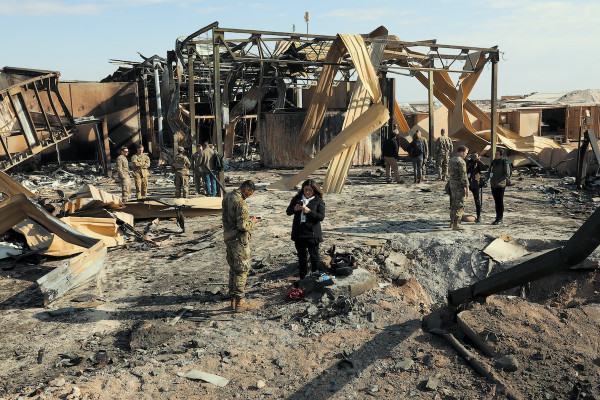

U.S. troops at Al-Asad Air Base had much more warning about the Iranian ballistic missile attack in January than defense officials have previously revealed, according to testimonials of troops who lived through the attack.
In the early morning of Jan. 8, a total of 11 Iranian ballistic missiles struck the Iraqi base, which hosts U.S. troops. More than 100 U.S. service members were diagnosed with mild traumatic brain injury as a result of the attack, which was in retaliation for the U.S. airstrike that killed Iranian Maj. Gen. Qasem Soleimani, former head of the Islamic Revolutionary Guard Corps.
While top U.S. military officials have said early warning systems allowed service members to take shelter in time, it is now clear that U.S. troops knew much further in advance about the pending attack.
“Within a matter of hours, leaders at the squadron level had to decide which airmen should evacuate, and who should stay in harm’s way to ensure mission continuity,” according to an account of the attack posted online by U.S. Air Forces Central Command.
Capt. Wesley Florez, executive officer with the 1st Expeditionary Rescue Group, said he received a report on the afternoon of Jan. 7 that Iran was preparing to launch ballistic missiles at the base, according to the testimonials.
Several other airmen said they learned of the impending attack around 8 p.m. on Jan. 7, according to the testimonials. They were told the time of the attack could be between 11 p.m. and 1 a.m., and the Iranian missiles could include biological or chemical agents.
Lt. Col. Staci Coleman, commander of the 443rd Air Expeditionary Squadron, said she quickly had to decide which airmen needed to stay behind.
“I was being forced to gamble with my members’ lives by something I couldn’t control,” Coleman said. “I was deciding who would live and would die. I honestly thought anyone remaining behind would perish. I didn’t believe anyone would survive a ballistic missile attack and it made me feel sick and helpless.”
“In the end, I said a prayer and asked God to guide my action and protect my troops,” she continued. “I resolved to place the fate of my team in His hands and I refocused my attention on executing the plan.”
Maj. Jonathan Jordan, the squadron’s director of operations, said his heart sank when he read a threat report warning to expect “rockets from Iran.”
“I knew that meant missiles,” said Jordan, who was tasked with leading the team of service members being evacuated.
Jordan said he knew the squadron had to evacuate as many service members as possible and it needed to be prepared for “total destruction.”
“People were calling back home, not knowing if it would be the last time they would see or hear from them,” said Master Sgt. Janet Liliu. “My kids were at school when they got my messages and one-by-one, they called me. I was heartbroken, but I had to focus.”
“Half of my team was staying and the other half was leaving,” she continued. “Seeing my guys’ faces and hugging them before they left is something I’ll never forget.”
When the missiles, hit, they ignited a fire in a tent that caused ammunition stored inside to explode, one anonymous airman said.
The airman held his M-4 carbine as ballistic missiles continued to land.
“All I could think of were my daughters,” the airman said. “They love for me to sing ‘You are my sunshine,’ so I started singing quietly to myself and I waited for that final moment. I had fully accepted that I would die in that shelter with my team.”